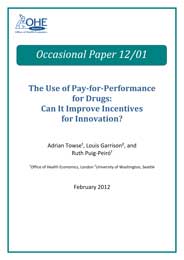Interest is growing in schemes that involve “paying for pills by results”, that is, “paying for performance” rather than merely “paying for pills”. Despite its intuitive…
Interest is growing in schemes that involve “paying for pills by results”, that is, “paying for performance” rather than merely “paying for pills”. Despite its intuitive appeal, this approach is highly controversial and is disliked by many health care providers, policy makers, and…
Interest is growing in schemes that involve “paying for pills by results”, that is, “paying for performance” rather than merely “paying for pills”. Despite its intuitive appeal, this approach is highly controversial and is disliked by many health care providers, policy makers, and pharmaceutical companies.
In this paper, the authors define pay-for-performance and the related terms used in discussions about such schemes; set out a framework for understanding and interpreting them; explore existing schemes, providing examples; discuss the benefits and weaknesses of such schemes; and consider their value as an incentive for innovation.
In the literature to date, the authors note, identified benefits are countered by significant costs and challenges. As a result, the overall balance remains unclear, despite strong opinions regarding one specific scheme (the UK’s risk sharing scheme for multiple sclerosis drugs). They find that sentiment is strong against outcomes based schemes. Two related problems are identified by the authors as being behind the hesitation to make use of pay-for-performance schemes. The first is a tendency to focus on the negatives of experience to date, despite the lack of good evidence; the second is the predominance of rather naïve views about the feasibility of the alternatives.
Rewarding those products that do deliver performance (in the form of health gain and other benefits) is very important in stimulating innovation. The authors conclude that “pay-for-performance” offers an important way forward to both handle uncertainty around expected value in routine clinical practice and provide the rewards essential for continued innovation.
